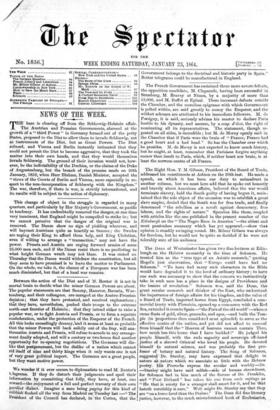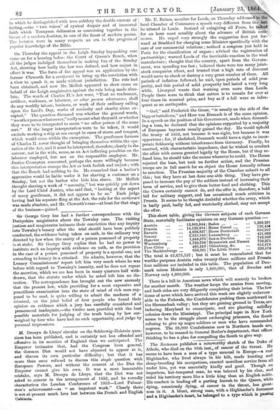The Dean of Westminster has given two fine lectures at
Edin- burgh on the Hebrew monarchy in the time of Solomon. He treated him as the "true typa of an Asiatic monarch," quoting Hegel's just observation, that " Europa could have had no Solomon." " To have had many such characters in the Bible would have degraded it to the level of ordinary history ; to have one such was necessary to show that the concern we instinctively take in such men has a place in the designs of Providence and the lessons of revelation." Solomon was, said the Dean, the great secular monarch and thinker of the East, who understood the importance of foreign affairs for his kingdom, and the value of a Board of Trade, imported horses from Egypt, concluded a com- mercial treaty with Phoenicia, opened up a commerce with the Red Sea, extended it even to Spain—"the Peru of the old world"—whence came fleets of gold, silver, peacocks, and apes,—and built the Tem- ple (in proportions then considered most splendid) to serve as the effective centre of the nation, and yet did not affect to conceal from himself that the " Heaven of heavens cannot contain Thee, how much less this house that I have builded !" He judged his people himself, with the rude sagacity and sovereign off-hand justice of a shrewd Oriental who loved his people. He devoted himself to natural science, and was probably the first pro- fessor of botany and natural history. The Song of Solomon, suggested Dr. Stanley, may have expressed that delight in nature as nature which we associate so little with the Hebrew poetry. His Proverbs express the secular and worldly—Dr. —Stanley might have said selfish—side of human shrewdness, for Solomon had in him much of the flavour of Dr. Franklin, and " Poor Richard " has taken his cue from such sayings as "He that is surety for a stranger shall smart for it, and he that hateth suretiship is sure." Well might Dr. Stanley say that they are "on a lower level than the Psalms." The Dean did fine literary justice, however, to the much misunderstood book of Ecclesiastes,
in which he distinguished with true subtlety the double current of feeling,—the " two voices" of cynical despair and of immortal faith which Tennyson delineates as conversing together in the breast of a modern doubter, in one of the finest of modern poems. The lectures were in many respects an era in the progress of popular knowledge of the Bible.



































